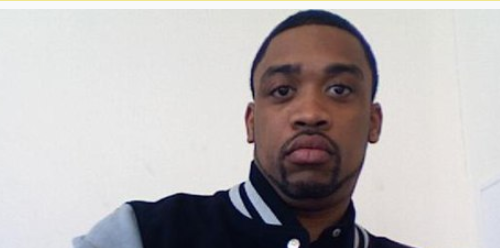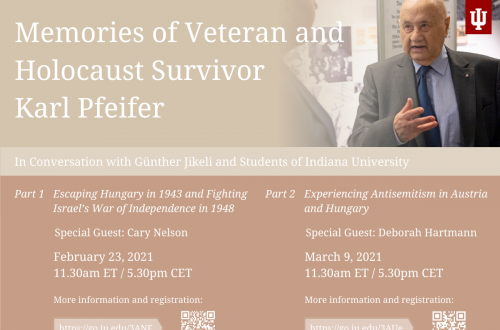Cross-posted from Hungarian Spectrum
The Vienna Wiesenthal Institute for Holocaust Studies and the Center for Advanced Holocaust Studies of the United States Holocaust Memorial Museum organized a conference on “Collaboration in Eastern Europe during World War II and the Holocaust.” The three-day conference took place in Vienna between December 5 and 7. The conference aimed at bringing together scholars from all disciplines working on complicity and collaboration in a number of European countries to share their research with each other and the public. Karl Pfeifer, a faithful reader of and contributor to Hungarian Spectrum, was present and arranged an interview with Paul A. Shapiro, Director of the United States Holocaust Memorial Museum’s Center for Advanced Holocaust Studies. You may remember Mr. Shapiro’s testimony entitled “The Trajectory of Democracy: Why Hungary Matters,” which was delivered at the hearing of the U.S. Commission on Security and Cooperation in Europe on March 20, 2013 and which could be read in its entirety on Hungarian Spectrum. Here is Karl’s interview with Mr. Shapiro.
Karl Pfeifer: Mr. Shapiro, how do you view this symposium? What is your opinion about it and what are your thoughts on the situation in Eastern Europe?
Paul Shapiro: The purpose of organizing this symposium together with the Vienna Wiesenthal Institute was to bring together a group of especially young researchers to talk about issues of collaboration during the Holocaust. As you could hear from the lectures, this subject is a very complicated one. It involves more than just the collaboration of states, it involves more than just the collaboration of people who might have joined SS units from among the local population or people who might have been in the local police unit that participated in the crimes of the Nazi era and the murder of the Jews during the era of Nazi domination of Europe. The questions go right to the involvement of bureaucrats, the involvement of professionals, the involvement of individuals who for one reason or another were willing to participate in mass murder or to acquiesce in mass murder or to stand aside thinking that they were playing no role. But, of course, when crimes are being committed, when governments are engaging in the persecution of one group or another, people who stand aside are empowering the persecutors, empowering the perpetrators. To be a so-called bystander is not a neutral act. In fact it is enabling the killers to commit their crimes.
You can see large participation here by scholars from countries of the former USSR where this subject is really new since the fall of communism and the disintegration of the USSR. You can see a large number of scholars from the countries of former communist countries of Eastern Europe where the subject of local collaboration could not be addressed in a forthright way in the past. So, our goal was to bring together a group of historians in Vienna. We decided on Vienna because it was easier to organize it physically here rather than in Washington. The idea was to encourage a working process between scholars from the East and the West, especially young people who will work on the subject matter for the next thirty or forty years. We wanted to bring them together to think about one of the most difficult issues from the Holocaust era which is the failure of everyone, of states, of professions, of local organizations, of churches and of individuals to protect people who were members of a society but found themselves with no protection whatsoever.
KP: Let’s go to the next question, about Hungary. You made a very concise and important contribution to the hearing of the American Congress on Hungary and I would like to have your opinion on how one can explain that the country that was the most advanced among the former communist countries after the change of the system became one of the most, I would say, the most dangerous country for the Jews not in the physical sense so much, but where hatred toward Jews is manifested openly and spread in the media close to the government party, Fidesz. Like Echo TV, Magyar Hirlap, a daily, and the weekly Demokrata. What is your opinion about that?
PS: So, you ask me to explain that. This is very complicated. There is a combination of ideology, of seeking to create a new national narrative in the aftermath of the communist era, of anti-Semitism of an old style that has combined to create this situation. Explaining it is very complicated. Understanding what one’s obligation is to do in such a situation is actually less complicated.
KP: Could you tell me?
PS: In this particular situation it would be essential that the Hungarian government, Hungarian society find a way to change the trajectory the country is on. The country is moving toward increasing hatred of Jews resulting in increasing danger for Jews and other national minorities. We believe that some of this is the result of a desire to obscure or to distort the history of the Holocaust. It is more difficult to promote anti-Semitism when one recognizes the degree of Hungarian participation in the destruction and murder of hundreds of thousands of Hungarian Jews just a few decades ago. It is difficult to justify a positive image, for instance, of Miklós Horthy or the propagandists of the fascist era and the cultural figures of the fascist era, like Nyirő.
KP: Wass, Tormay.
PS: And the result of their actions was mass murder. For our museum the link between contemporary anti-Semitism and distortion of the Holocaust is direct. This is what motivates us to address the historical issues in a direct way. And to encourage the Hungarian government to do the same. Not to simply say that this is a controversial issue. Calling it a controversial issue means that it hasn’t been explained well enough to the population at large. Because the facts are clear. The political motivations extend behind certain actions of the Hungarian government today. This is also clear. It is the government that wants to be reelected. There is strong popular, populist support for the Jobbik party and strong populist support for Fidesz as well, and the government is seeking to ensure its electoral victory in the coming year. This seems to work politically. On the other hand, there are long-term consequences of choosing the path of accepting manifestations of anti-Semitism, of not publicly criticizing in a powerful way members of the government and members of Fidesz who make anti-Semitic statements or who participate in actions to rehabilitate Miklós Horthy or who participate in the inclusion in textbooks of the works of fascist writers without explaining that these people were also killers. This is inexcusable because the long-term consequence of such policies is that the young people of Hungary will think that to be a killer, to be a fascist, was not something wrong. No democratic society will prosper if that is the lesson, if that is taught to young people.
KP: Perfect. Thank you very much, Mr. Shapiro. I appreciated it.


